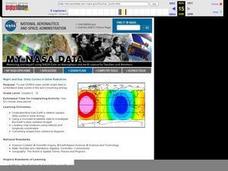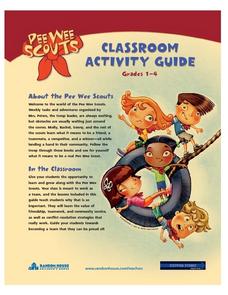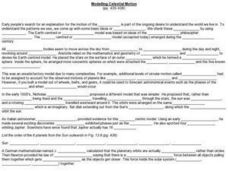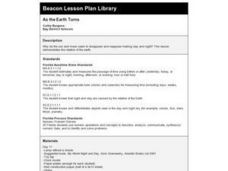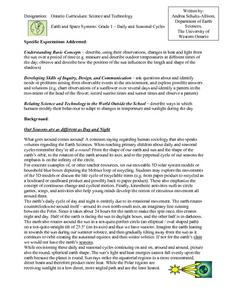Curated OER
Sound Blending Lesson Plan
Mr. Snowman wants to help emerging readers understand compound words, so he segments some familiar words to help them see that they are made of two distinct words. Learners repeat the words, both segmented and blended, and observe them...
Science 4 Inquiry
Phases of the Moon
The moon takes just over 27 days to orbit around Earth. Young scientists position themselves as the earth as they rotate around the sun and hold the moon. This allows them to observe the patterns and phases of the moon.
Curated OER
Friendly Letter to a Leprechaun
Students write friendly letters. In this friendly letter writing lesson, students write a friendly letter to a leprechaun. Students review the parts of a friendly letter then watch the teacher model how to write a friendly letter,...
Houghton Mifflin Harcourt
Nature Walk: English Language Development Lessons (Theme 2)
Walking in nature is the theme of a unit designed to support English language development lessons. Scholars look, write, speak, and move to explore topics such as camping, woodland animals, instruments,...
Lake Afton Public Observatory
Shadows, Angles, and the Seasons
Shine some light on the topic of seasonal change with this collection of activities. Whether it's by measuring the change in the length of their shadows, or modeling the earth's orbit around the sun using a lamp and a globe, these...
Curated OER
Introduce Vocabulary: Smoky Night
Learners investigate tier two vocabulary words. In this vocabulary lesson, students assess the meaning of vocabulary words found while reading Smoky Night. Learners record their new vocabulary words using a word journal or discovery chart.
K12 Reader
Add Interest with Synonyms
Kids add interest to a paragraph about a day at school by replacing flat, over-used words with synonyms.
North Shower Community College
Preparing for Tests, Taking Tests, Reducing Test Anxiety
As testing season is upon us, give class members a way to prepare their minds and bodies for the big day. A resource promotes deep breathing exercises and comfortability to reduce anxiety. Along with multiple choice, short...
NorthEast Ohio Geoscience Education Outreach
Earth, Sun and You
Middle schoolers model Earth's revolution round the sun by walking a mini-globe around a lamp. You will assess whether or not they tilt and rotate the planet properly and that the revolution is counterclockwise. Discussion beforehand...
Curated OER
NIGHT AND DAY: DAILY CYCLES IN SOLAR RADIATION
Students examine how Earth's rotation causes daily cycles in solar energy using a microset of satellite data to investigate the Earth's daily radiation budget and locating map locations using latitude and longitude coordinates.
Curated OER
Pee Wee Scouts
Students read books to discover the importance of friendship, teamwork, and community service. After reading the book, they discuss conflict resolution strategies. Students discuss healthy eating food pyramids. They write an essay...
Curated OER
Seasons
Students investigate the reason for seasons on Earth during three activities. They construct a model of the Earth and Sun to identify patterns in the changes of the angle of light on the Earth's surface. Then they conduct a heat...
Curated OER
Modeling Celestial Motion
In this modeling celestial motion worksheet, students fill in the blank about the motion of celestial bodies: planets and stars. Students complete the blanks with information about the scientists and philosophers responsible for early...
Curated OER
Moon Phases, Day/Night
Fifth graders observe a demonstration that shows how the alignment of the sun, moon, earth relate to the phases of the moon that occur each month. They describe the moon's phases after experimenting in a small group setting and recording...
Curated OER
Water Works Wonders
Students examine where water is found in the world, how we use it, and the various forms it takes. They observe the refraction of light through a prism, record the day and night sky over a week's time, and create a topographic model of...
Curated OER
As the Earth Turns
First graders explore why the sun and moon seems to disappear and reappear creating day and night.
Curated OER
Science: Daily and Seasonal Cycles
First graders use their observations to describe daily and seasonal cycles. through a demonstration using a suspended ball and flashlight, they determine the time of day in various locations. Next, 1st graders participate in a...
Curated OER
The Solar System
Students describe the different bodies that make up our solar system, explain the place of our solar system within the Milky Way Galaxy and the universe, explain day and night and the Earth's movement, and describe the relationship...
Curated OER
Models of the Earth and Moon
Students explore the earth's rotation and phases of the moon. In this planets lesson plan, students rotate and revolve around a light representing the sun. Students use movement and props to simulate what causes the phases of the moon as...
Curated OER
The Earth's Rotation
Learners see a model of a globe to watch the Earth rotate. In this Earth lesson plan, students rotate the globe and shine a flashlight to see where the sun shines and how it rises and sets. They create a diagram and explain day and night...
Gwinnett County Public Schools
Analysis of the Tuck Everlasting and The Birchbark House Text Exemplars
Looking to introduce some text-based questions into your ELA lessons? Practice the kinds of skills the Common Core demands with the seven text-based questions and the essay prompt provided here. Designed to be a three-day instructional...
World Wildlife Fund
Land of the Midnight Sun
From days of 24 hour sunlight, to endless nights that last for days, the Arctic is a very unique place to live. Examine the seasonal changes that occur in the northern-most reaches of the globe and the impact they have on the plants and...
Teacher's Corner
Diamonte (dee-a-MON-tay)
Did you say a diamonte? Ask your young poets to craft and polish this gem of a form poem. The fifth in a series of ten poetry writing exercises.
Curated OER
The Sun and Moon
Students understand basic concepts about Earth, the Sun and the Moon,
such as relative movement and the phases of the moon. Through discussion, looking at pictures, listening to Native American stories, observing, and building models,...











